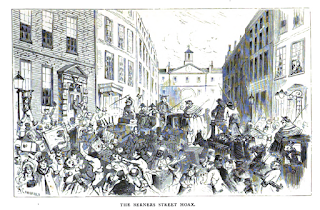The Great Berners Street Hoax: Chaos and Comedy in 19th Century London
The Berners Street hoax, a famous practical joke, was carried out in London on November 27, 1810. The mastermind behind this elaborate prank was Theodore Hook, a British composer and author known for his love of mischief and practical jokes.
The basic setup of the hoax was ingeniously simple yet remarkably effective. Hook bet his friend, Samuel Beazley, that he could transform any house in London into the most talked-about address in a week. He chose a house at 54 Berners Street, which belonged to Mrs. Tottenham, a widow unknown to Hook. Over a week, Hook sent out thousands of letters in Mrs. Tottenham's name, requesting deliveries, visitors, and assistance of various kinds.
On the day of the hoax, a wide array of people and services descended upon the house. This included tradesmen delivering goods, lawyers, clergymen, doctors, and even dignitaries like the Lord Mayor of London and the Duke of Gloucester. The street was congested with carriages and delivery carts, creating chaos and drawing immense public attention.
Despite the massive inconvenience caused, the Berners Street hoax had no long-term adverse effects on anyone involved. Mrs. Tottenham and her neighbors were disturbed and inconvenienced on the day, but there were no reports of serious harm. The event was seen as a humorous spectacle rather than a malicious act.
The impact of the hoax on the citizens of the day was significant. It was a subject of much amusement and was widely reported in newspapers, highlighting the city services' gullibility and inefficiencies. It also sparked discussions about privacy and the potential misuse of information.
The Berners Street hoax inspired similar pranks, but none matched its scale and notoriety. It remains a benchmark in the history of practical jokes, often referenced in discussions about hoaxes and public pranks.
Regarding the prize of the bet, it was not the monetary value that was significant but rather the challenge and the fame that came with its successful execution. Historical records do not detail whether any specific prize was paid out. Still, Theodore Hook certainly gained notoriety and a place in history as the orchestrator of one of the most famous hoaxes of the 19th century.



Comments
Post a Comment